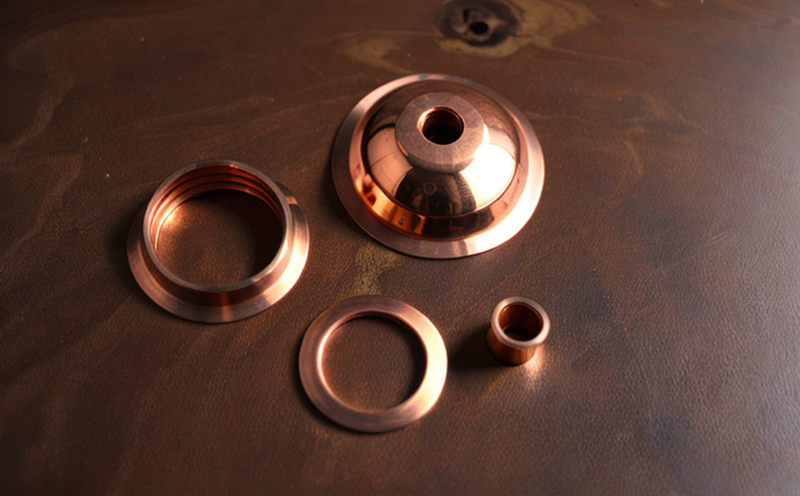RTCA DO 160 Section 7 Operational Shock Testing Validation Method Development Test
The RTCA/DO-160 standard is a comprehensive set of guidelines designed to ensure the reliability and survivability of avionics equipment used in commercial, military, and general aviation aircraft. Section 7 specifically addresses operational shock testing which involves subjecting electronic components and assemblies to simulated shock environments that mimic real-world conditions encountered during flight.
The objective of this test is to evaluate the robustness of copper and brass materials under extreme shock loads. These metals are often used in avionics systems due to their excellent electrical conductivity, thermal stability, and mechanical strength. The purpose of validating a testing method for these materials lies in ensuring that the equipment can withstand shocks without compromising performance or safety.
The process typically involves several stages: first, selecting appropriate test specimens cut from copper or brass sheets; secondly, calibrating the shock testing machine to generate precise and repeatable shock pulses; thirdly, applying these pulses according to predefined parameters; finally, inspecting both the physical integrity of the materials after the shock event as well as their functional performance.
During this validation phase, it's crucial that we establish a consistent and reproducible procedure for conducting operational shock tests. This includes defining acceptable levels of deformation or damage allowable without affecting functionality; specifying measurement techniques used to assess changes in material properties post-shock; establishing criteria for judging whether the tested item meets specified performance requirements.
The importance of accurate validation cannot be overstated as it directly impacts the reliability and safety of aircraft systems. Inaccurate or inconsistent testing methods could lead to underestimation of potential failures during actual flight operations, thus posing significant risks to passengers and crew members.
Our team at Eurolab has extensive experience in developing such validation protocols tailored specifically for copper and brass materials within the framework of RTCA/DO-160 Section 7. We employ state-of-the-art equipment capable of generating highly controlled shock pulses with variable amplitude, frequency, duration, and repetition rate.
| Standard | Description |
|---|---|
| RTCA/DO-160 Section 7 | Guidelines for operational shock testing of avionics equipment. |
| ASTM E492 | Standard practice for tensile testing of metallic materials. |
Our approach ensures that all aspects of the test procedure are meticulously documented, allowing for transparent reproduction and verification by third parties. By adhering strictly to these standards, we provide assurance not only regarding compliance but also enhance confidence in the results obtained.
Why It Matters
The robustness of copper and brass materials plays a critical role in determining the overall reliability of avionics systems. These metals are subjected to extreme environmental conditions during flight, including temperature fluctuations, vibration, electromagnetic interference (EMI), and mechanical shocks. Ensuring that these materials can withstand such harsh environments is essential for maintaining system integrity.
Shock testing specifically targets the ability of copper and brass components to survive sudden impacts or vibrations without failing. This capability is vital because even minor damage to these parts could disrupt critical functions like communication, navigation, or power distribution within aircraft systems. Such disruptions can lead to operational issues that compromise safety and efficiency.
By conducting rigorous validation tests according to RTCA/DO-160 Section 7, manufacturers and designers gain confidence in the durability of their products. This not only facilitates smoother product development cycles but also reduces risk associated with unforeseen failures during service life.
The outcomes from these tests help inform design improvements aimed at enhancing resistance against shocks while preserving essential functionalities. Moreover, they enable better alignment between theoretical predictions and practical applications through empirical validation processes.
Applied Standards
| Standard | Description |
|---|---|
| RTCA/DO-160 Section 7 | Guidelines for operational shock testing of avionics equipment. |
| ASTM E492 | Standard practice for tensile testing of metallic materials. |
Eurolab Advantages
At Eurolab, we bring together a wealth of expertise and advanced facilities to deliver unparalleled quality in RTCA/DO-160 Section 7 operational shock testing validation method development. Our team comprises highly skilled engineers with deep knowledge of aerospace materials science and testing methodologies.
We utilize cutting-edge equipment capable of generating precise and repeatable shock pulses across a wide range of parameters, ensuring consistent test results. This precision is crucial given the stringent requirements set forth by RTCA/DO-160 Section 7.
Our commitment to accuracy extends beyond mere compliance; we strive for excellence in every aspect of our work. From initial consultation through final report generation, we maintain open lines of communication with clients to ensure they receive comprehensive support throughout the testing process.
In addition to technical proficiency, Eurolab prides itself on delivering exceptional service tailored specifically to meet each client's unique needs. Whether you require assistance in selecting appropriate test specimens or need guidance interpreting your findings, our dedicated team is here to assist.





